Yankee Quill Award Program Book Ads
 Congratulate your friends and colleagues for their extraordinary accomplishments by placing an ad in the celebratory program!
Congratulate your friends and colleagues for their extraordinary accomplishments by placing an ad in the celebratory program!
If you are interested in supporting one of this year’s Yankee Quill recipients with a congratulatory ad in the program, please complete the form below. The celebratory luncheon will take place at noon, on Friday, April 29, 2022, at the Renaissance Boston Waterfront Hotel in Boston, MA.
NEACE Expands Focus and Spring Conference Dates Announced
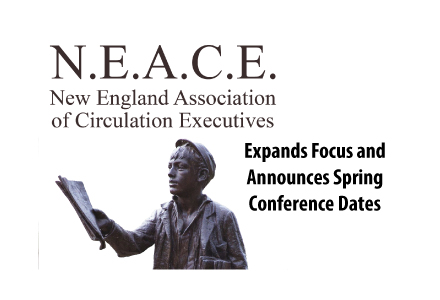 In a thoughtful letter to New England newspaper professionals, Warren C. Dews Jr., president of NEACE (New England Association of Circulation Executives), announces the dates for the organization’s Spring Conference, scheduled for Sunday, May 22 and Monday, May 23 at the Red Lion Inn in Stockbridge, MA.
In a thoughtful letter to New England newspaper professionals, Warren C. Dews Jr., president of NEACE (New England Association of Circulation Executives), announces the dates for the organization’s Spring Conference, scheduled for Sunday, May 22 and Monday, May 23 at the Red Lion Inn in Stockbridge, MA.
Dews also challenges us to think about the meaning of circulation in modern publishing and reveals that the 105-year-old organization is expanding its focus and will now be covering Marketing, Advertising, Production/Operations, and Circulation.
Dear Newspaper Colleagues and Friends,
My name is Warren C. Dews Jr., President of NEACE (New England Association of Circulation Executives). I am excited to announce our organization’s upcoming plans, but first let me start by asking a simple question: what is circulation?
Think about your answer but keep reading.
It has been almost three years since we were able to meet for our amazing NEACE Spring Conference. It was one of the most humbling experiences in my life to be named the very first African-American to hold the President position in the 102-year history of this prestigious organization. Three years later, we are now 105-years old and, like so many other organizations across the country, we have emerged from extremely difficult and challenging times.
We are still here, and we aren’t going anywhere. Our Spring Conference “The Pivot, The New Normal,” is the next chapter in our story and will lay out the next steps for our future.
I’m here to officially let you know that N.E.A.C.E. will expand its focus. We will now be covering Marketing, Advertising, Production/Operation, and Circulation. Our name will stay the same, but our focus will be changing, and we will change the meaning of circulation.
So, again, I ask: what is circulation? It is what is needed to grow your business. Circulation, also known as readership, means reaching a diverse audience. You must understand how to market and advertise your brand. You must be able to produce a product and deliver it to your consumer the way they want and need it. Print and digital are undeniably important: learning how to pivot with the changing environment via both platforms is essential to survival. You must be what and where your consumer’s needs are found. N.E.A.C.E. is now the New England Association of Circulation Executives. Yes, same name, but with a twist.
Come to this year’s Spring Conference in the beautiful Berkshires of Massachusetts at the famous and illustrious Red Lion Inn in Stockbridge. This is happening Sunday, May 22, and Monday, May 23 – so mark your calendars. We will cover how to increase readership by using influencers through digital partnerships. You will gain a wealth of knowledge from an expert with over 20 years of experience in digital advertising and marketing. You will learn the best ways for your market to grow revenue by still focusing on digital and print revenue. We will also have an expert discussing the best ways to monetize your content and/or use your content to better understand your customer funnel flow. You will leave this meeting with powerful nuggets of knowledge to bring back to your company.
Come and join the new N.E.A.C.E. Because circulation is everything and a lot more – you’ll see.
Sincerely,
Warren C. Dews Jr., President
New England Newspaper Hall of Fame Program Book Ads
Congratulate your friends and colleagues for their extraordinary accomplishments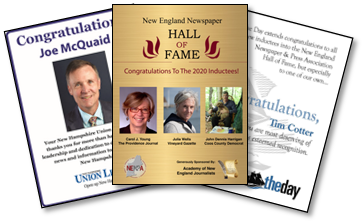 by placing an ad in the celebratory program!
by placing an ad in the celebratory program!
If you are interested in running a congratulatory ad to support one of the six New England journalists who will be inducted into the New England Newspaper Hall of Fame, please fill out the form below. The celebration will take place on Friday, April 29, 2022, at the Renaissance Boston Waterfront Hotel in Boston, MA.
Six journalists to be inducted into the New England Newspaper Hall of Fame
 The New England Newspaper and Press Association is pleased to announce that six New England journalists will be inducted into the New England Newspaper Hall of Fame, recognizing the most outstanding newspaper professionals from throughout our six-state region.
The New England Newspaper and Press Association is pleased to announce that six New England journalists will be inducted into the New England Newspaper Hall of Fame, recognizing the most outstanding newspaper professionals from throughout our six-state region.
More than 100 individuals have been singled out over the past 20 years for their extraordinary contributions to their newspaper, the news industry, and their communities.
The Hall of Fame awards will be presented at a celebratory dinner as part of the annual convention of the New England Newspaper and Press Association on Friday, April 29, 2022, at the Renaissance Boston Waterfront Hotel in the Seaport District of Boston, Mass. For more information, please click here.
The 2022 inductees are:
 Linda Lotridge Levin started her extraordinary career in the 1960s at The Providence Journal as one of the first women to cover actual news. She leveraged her reporting career into a teaching one – as professor and eventually chair of the Department of Journalism at the University of Rhode Island. She has educated hundreds of students over three decades on media law, advanced news reporting, the history of American journalism, and the critical importance of journalism in a democracy. She has been a fellow at the Poynter Institute, the American Press Institute, and the Annenberg Washington Program. Linda is the former president of the Rhode Island Press Association and board member and founder of ACCESS / Rhode Island, a coalition of organizations devoted to open government. She has received several awards, including the prestigious Yankee Quill. She is also the author of “The Making of FDR: The Story of Stephen T. Early, America’s First Modern Press Secretary.”
Linda Lotridge Levin started her extraordinary career in the 1960s at The Providence Journal as one of the first women to cover actual news. She leveraged her reporting career into a teaching one – as professor and eventually chair of the Department of Journalism at the University of Rhode Island. She has educated hundreds of students over three decades on media law, advanced news reporting, the history of American journalism, and the critical importance of journalism in a democracy. She has been a fellow at the Poynter Institute, the American Press Institute, and the Annenberg Washington Program. Linda is the former president of the Rhode Island Press Association and board member and founder of ACCESS / Rhode Island, a coalition of organizations devoted to open government. She has received several awards, including the prestigious Yankee Quill. She is also the author of “The Making of FDR: The Story of Stephen T. Early, America’s First Modern Press Secretary.”
 Leonard I. Levin served as The Providence Journal’s news editor for 30 years, overseeing the copy desk with a velvet fist. His monthly “Excellence Newsletter” would offer compliments or throw barbs at reporters and editors – a brilliant incentive to get it right. He was also was a teacher – he trained scores of copyeditors who went on to work on “the horseshoe” at The New York Times, The Washington Post, the Boston Globe, the Los Angeles Times, and many other metro papers. He also taught journalism as an adjunct professor at the University of Rhode Island. When Len took early retirement from The Journal in the mid-1990s, he didn’t stop. He pivoted. He became a copyeditor for the Patriot Ledger and eventually ended up editing Rhode Island Supreme Court decisions. He served as president of both the New England chapter of the Society of Professional Journalists and the New England Society of Newspaper Editors and is also a recipient of the Yankee Quill Award.
Leonard I. Levin served as The Providence Journal’s news editor for 30 years, overseeing the copy desk with a velvet fist. His monthly “Excellence Newsletter” would offer compliments or throw barbs at reporters and editors – a brilliant incentive to get it right. He was also was a teacher – he trained scores of copyeditors who went on to work on “the horseshoe” at The New York Times, The Washington Post, the Boston Globe, the Los Angeles Times, and many other metro papers. He also taught journalism as an adjunct professor at the University of Rhode Island. When Len took early retirement from The Journal in the mid-1990s, he didn’t stop. He pivoted. He became a copyeditor for the Patriot Ledger and eventually ended up editing Rhode Island Supreme Court decisions. He served as president of both the New England chapter of the Society of Professional Journalists and the New England Society of Newspaper Editors and is also a recipient of the Yankee Quill Award.
 Greg Popa joined the Stowe Reporter as a photographer more than 30 years ago and has since been a reporter, editor, advertising manager, and publisher. In addition to his publishing duties, Popa is also the editor of the twice-yearly award-winning Stowe Guide as well as its art director. In these rocky economic times for newspapers, Greg has not only led the way to financial stability for the Stowe Reporter group but has expanded its reach, bringing outstanding journalism and excellent publications to Vermont communities. Greg has long had an interest in nurturing young journalistic talent and there are scores of successful journalists throughout New England who have benefited from his mentoring and his commitment to producing quality local, community journalism. He is also very active in community affairs and is on several boards.
Greg Popa joined the Stowe Reporter as a photographer more than 30 years ago and has since been a reporter, editor, advertising manager, and publisher. In addition to his publishing duties, Popa is also the editor of the twice-yearly award-winning Stowe Guide as well as its art director. In these rocky economic times for newspapers, Greg has not only led the way to financial stability for the Stowe Reporter group but has expanded its reach, bringing outstanding journalism and excellent publications to Vermont communities. Greg has long had an interest in nurturing young journalistic talent and there are scores of successful journalists throughout New England who have benefited from his mentoring and his commitment to producing quality local, community journalism. He is also very active in community affairs and is on several boards.
 Charles “Chuck” Goodrich has been a leader in New England newsrooms for 40 years, dedicating his career to the betterment of community newspapers. He began as a reporter for the Brunswick (ME) Times Record before serving as the longest-tenured senior executive in GateHouse New England until his departure in 2018. Chuck was either an advertising or circulation director or publisher almost from the beginning of what would eventually become GateHouse New England. He worked for Harte-Hanks, Bay State Newspapers, various phases of Community Newspaper Company, Herald Media, and finally GateHouse. He is one of the last of a breed of publisher well known among many of his newspapers’ readers for his physical presence in their communities. He was also the behind-the-scenes progenitor of so many decisions that allowed those readers’ newspapers to survive, and often thrive, in good times and in bad. Chuck is now president and CEO of Newspapers of New England with publications in Massachusetts and New Hampshire.
Charles “Chuck” Goodrich has been a leader in New England newsrooms for 40 years, dedicating his career to the betterment of community newspapers. He began as a reporter for the Brunswick (ME) Times Record before serving as the longest-tenured senior executive in GateHouse New England until his departure in 2018. Chuck was either an advertising or circulation director or publisher almost from the beginning of what would eventually become GateHouse New England. He worked for Harte-Hanks, Bay State Newspapers, various phases of Community Newspaper Company, Herald Media, and finally GateHouse. He is one of the last of a breed of publisher well known among many of his newspapers’ readers for his physical presence in their communities. He was also the behind-the-scenes progenitor of so many decisions that allowed those readers’ newspapers to survive, and often thrive, in good times and in bad. Chuck is now president and CEO of Newspapers of New England with publications in Massachusetts and New Hampshire.
 Loren Ghiglione served as the editor and publisher of the Southbridge (MA) Evening News for 26 years. Innovation and idealism have characterized his work as a defender of press freedom, advocate for inclusion, media critic, and leader of national organizations of journalism educators and journalists. He has served as president of the New England Press Association, the New England Society of Newspaper Editors, and the American Society of Newspaper Editors, Ghiglione is best known as an advocate for greater inclusion throughout the news industry. He has received diversity awards from the Asian American Journalists Association, the National Association of Multicultural Media Executives, the National Broadcast Editorial Association, the National Conference of Editorial Writer, and the National Association of Black Journalists (the Ida B. Wells Award).
Loren Ghiglione served as the editor and publisher of the Southbridge (MA) Evening News for 26 years. Innovation and idealism have characterized his work as a defender of press freedom, advocate for inclusion, media critic, and leader of national organizations of journalism educators and journalists. He has served as president of the New England Press Association, the New England Society of Newspaper Editors, and the American Society of Newspaper Editors, Ghiglione is best known as an advocate for greater inclusion throughout the news industry. He has received diversity awards from the Asian American Journalists Association, the National Association of Multicultural Media Executives, the National Broadcast Editorial Association, the National Conference of Editorial Writer, and the National Association of Black Journalists (the Ida B. Wells Award).
 George Geers has always had ink flowing through his veins as a career journalist and book publisher. He dipped his toe into the newspaper world as a college intern reporter at Foster’s Daily Democrat, rising through the ranks there until being named managing editor. From Foster’s he held editor positions at the Southbridge (MA) News, The Chronicle in Willimantic, CT, and The Telegraph in Nashua, NH. In 2000 he formed Plaidswede Publishing and continued his journalism career as an editor at the New England Newspaper Association. George has been involved with the New Hampshire Writers’ Project since 2000, serving as President from 2006-2007 and, most recently as executive director. He is a founding board member of the New England First Amendment Coalition, clerk of the Academy of New England Journalists, has served as executive director of the New Hampshire Press Association, and is a recipient of the Yankee Quill Award.
George Geers has always had ink flowing through his veins as a career journalist and book publisher. He dipped his toe into the newspaper world as a college intern reporter at Foster’s Daily Democrat, rising through the ranks there until being named managing editor. From Foster’s he held editor positions at the Southbridge (MA) News, The Chronicle in Willimantic, CT, and The Telegraph in Nashua, NH. In 2000 he formed Plaidswede Publishing and continued his journalism career as an editor at the New England Newspaper Association. George has been involved with the New Hampshire Writers’ Project since 2000, serving as President from 2006-2007 and, most recently as executive director. He is a founding board member of the New England First Amendment Coalition, clerk of the Academy of New England Journalists, has served as executive director of the New Hampshire Press Association, and is a recipient of the Yankee Quill Award.
Yankee Quill Award Celebration
 Six New England journalists will receive the prestigious Yankee Quill award this spring for their contributions to the betterment of journalism in the six-state region.
Six New England journalists will receive the prestigious Yankee Quill award this spring for their contributions to the betterment of journalism in the six-state region.
Five current journalists and one historical figure will be honored with the award on April 29, 2022, says George Geers, chair of the sponsoring Academy of New England Journalists.
The inductees were selected in 2021, but the celebration and induction ceremony was postponed due to the pandemic.
The Yankee Quill awards will be presented at a luncheon as part of the annual convention of the New England Newspaper and Press Association at noon, on Friday, April 29, 2022, at the Renaissance Boston Waterfront Hotel in the Seaport District of Boston, Mass.
The honorees are:
 Paul Bass, founder, publisher, and editor of the New Haven Independent, one of the country’s leading nonprofit digital news organizations. For more than 40 years, Bass has provided the city of New Haven with outstanding news coverage, earning multiple regional and national awards for journalistic excellence – first with the New Haven Advocate, and now with the New Haven. He is described as a “change-maker,” a champion for Black and Brown people, and a promoter of the advancement of women in the news industry.
Paul Bass, founder, publisher, and editor of the New Haven Independent, one of the country’s leading nonprofit digital news organizations. For more than 40 years, Bass has provided the city of New Haven with outstanding news coverage, earning multiple regional and national awards for journalistic excellence – first with the New Haven Advocate, and now with the New Haven. He is described as a “change-maker,” a champion for Black and Brown people, and a promoter of the advancement of women in the news industry.
 Tom Condon served the profession for 45+ years as a bureau chief, columnist, editorial writer, and investigative reporter, wit and conscience at the Hartford Courant. His powerfully written columns and editorials have helped free three wrongly accused men, saved historic buildings from demolition, and helped get the state of Connecticut to drastically change its gun laws. He is currently working at CT Mirror.
Tom Condon served the profession for 45+ years as a bureau chief, columnist, editorial writer, and investigative reporter, wit and conscience at the Hartford Courant. His powerfully written columns and editorials have helped free three wrongly accused men, saved historic buildings from demolition, and helped get the state of Connecticut to drastically change its gun laws. He is currently working at CT Mirror.

Melvin B. Miller, founder, publisher, and editor of the Bay State Banner for more than 55 years, a weekly newspaper advocating for the interests of Greater Boston’s African American community. For over five decades, Miller has used his voice to dive deeper into issues ranging from politics, social justice, and economic development that have local and national impact. The Banner has meticulously told the stories of the minority community – stories often overlooked in mainstream media.
 Marianne Stanton, who has spent more than 40 years at the weekly Inquirer and Mirror on Nantucket Island, Mass., including as editor and publisher, grew up with the paper which was owned by her parents for many years before being sold to Ottaway Newspapers in 1990. She started as a reporter, became editor, and then publisher. Under her leadership, the paper has won numerous awards and gained a stellar reputation for its integrity and unwavering belief in the right of people to know what their public officials are doing. The paper was sold several more times to other chains but most recently was returned to its original local ownership.
Marianne Stanton, who has spent more than 40 years at the weekly Inquirer and Mirror on Nantucket Island, Mass., including as editor and publisher, grew up with the paper which was owned by her parents for many years before being sold to Ottaway Newspapers in 1990. She started as a reporter, became editor, and then publisher. Under her leadership, the paper has won numerous awards and gained a stellar reputation for its integrity and unwavering belief in the right of people to know what their public officials are doing. The paper was sold several more times to other chains but most recently was returned to its original local ownership.
 Terrence L. Williams, president and chief executive officer of the Keene Sentinel in New Hampshire is the definition of an accomplished newspaper leader, both as an editor and a publisher. He has been one of New England’s leading publishing executives throughout most of his distinguished 40-year career. His news products have won numerous awards for excellence in journalism and bold revenue solutions. He is an outstanding leader and strong communicator and is regarded as one of the most thoughtful and collaborative publishers in New England media.
Terrence L. Williams, president and chief executive officer of the Keene Sentinel in New Hampshire is the definition of an accomplished newspaper leader, both as an editor and a publisher. He has been one of New England’s leading publishing executives throughout most of his distinguished 40-year career. His news products have won numerous awards for excellence in journalism and bold revenue solutions. He is an outstanding leader and strong communicator and is regarded as one of the most thoughtful and collaborative publishers in New England media.
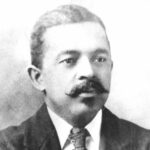 William Monroe Trotter (1872-1934) historical figure, was a major early 20th-century civil rights activist who founded the Boston Guardian newspaper. Trotter, the first Black Harvard University graduate who was a member of Phi Beta Kappa, challenged the political dominance of Booker T. Washington and was an inspiration for the formation of the National Association for the Advancement of Colored People. Besides founding the Boston Guardian in 1901, Trotter was a founder of the National Negro Suffrage League, the Niagara Movement, and the Negro American Political League. During his life, Trotter’s outspoken activism included his direct denouncements of President Theodore Roosevelt for discharging three companies of the all-Black 25th U.S. Infantry after the Brownsville Riot in Texas, in 1906, and for confronting President Woodrow Wilson in 1914 after Wilson imposed racial segregation on federal employees for the first time. In 1915, Trotter led the Boston protests against the screening of the racist film The Birth of a Nation.
William Monroe Trotter (1872-1934) historical figure, was a major early 20th-century civil rights activist who founded the Boston Guardian newspaper. Trotter, the first Black Harvard University graduate who was a member of Phi Beta Kappa, challenged the political dominance of Booker T. Washington and was an inspiration for the formation of the National Association for the Advancement of Colored People. Besides founding the Boston Guardian in 1901, Trotter was a founder of the National Negro Suffrage League, the Niagara Movement, and the Negro American Political League. During his life, Trotter’s outspoken activism included his direct denouncements of President Theodore Roosevelt for discharging three companies of the all-Black 25th U.S. Infantry after the Brownsville Riot in Texas, in 1906, and for confronting President Woodrow Wilson in 1914 after Wilson imposed racial segregation on federal employees for the first time. In 1915, Trotter led the Boston protests against the screening of the racist film The Birth of a Nation.
The Yankee Quill, which began in 1959, is bestowed annually by the Academy of New England Journalists through the auspices of the New England Society of News Editors. It is considered the highest individual honor awarded to newspaper, TV, radio, magazine, and other journalists in the six-state region. Winners are selected based on a history of lifetime achievement showing a broad impact in New England Journalism.
Selection for the award is not based on any single achievement, or for doing your job each day, but rather on the broad influence for good over the course of a career.
Sunshine Week Participation Around New England
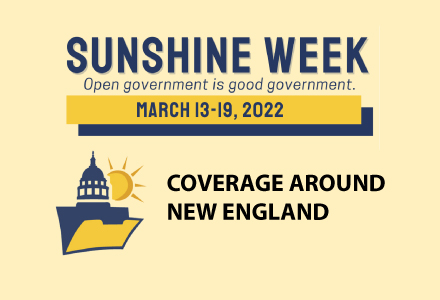 Last week was Sunshine Week and we are pleased that so many New England publications ran an editorial on the importance of open government – raising our collective voice for transparency and access to public information and reinforcing what it means for your readers and community.
Last week was Sunshine Week and we are pleased that so many New England publications ran an editorial on the importance of open government – raising our collective voice for transparency and access to public information and reinforcing what it means for your readers and community.
NENPA worked with the New England First Amendment Coalition (NEFAC) on this year’s Sunshine Week initiative, March 13-19. Publications were encouraged to run their own editorial or publish an editorial in support of Sunshine Week, written by NEFAC Executive Director Justin Silverman.
These publications wrote their own editorials in support of Sunshine Week
A lesson in ‘sunshine’ from across a war zone – The Boston (MA) Globe
Shining the light – The Martha’s Vineyard (MA) Times
Remote access to public meetings a pandemic legacy to celebrate – Providence (RI) Business News
Shedding Light, Promoting Truth Are Right In Our Wheelhouse – The Newtown (CT) Bee
Let the Sun Shine in On Open Government and Freedom of Information | Daily Item, Lynn, MA
Groups Call for Making Online Meeting Access Permanent | State House News Service, Boston, MA
New Hampshire Released a Statewide List of Problem Police Officers. No Such List Exists in Massachusetts | Telegram & Gazette, Worcester, MA
When Government Controls All Information, Citizens Aren’t Free | Keene (NH) Sentinel
Below are news organizations that published the NEFAC op/ed:
NEFAC’s Justin Silverman Discusses Open Government (audio) | WBSM-New Bedford, MA
Eagle-Tribune | Newport This Week | MassLive | Booth Bay Register | Caledonian Record | Greenfield Recorder | Newport Daily News | Daily Hampshire Gazette | Portland Press Herald | Valley Independent Sentinel | East Bay RI | Provincetown Banner | Gloucester Times | Wyoming Tribune Eagle | The Salem News | Wakefield Daily Item | The Chronicle | The Daily News of Newburyport | Wiscasset Newspaper | The Day | Business NH Magazine | The Berkshire Eagle | Concord Monitor | News and Citizen | The New Bedford Light | The Deerfield Valley News | The Other Paper | Shelburne News | The Stoneham Independent | Daily Times Chronicle
Sunshine Letter Sent to MA Governor’s Council
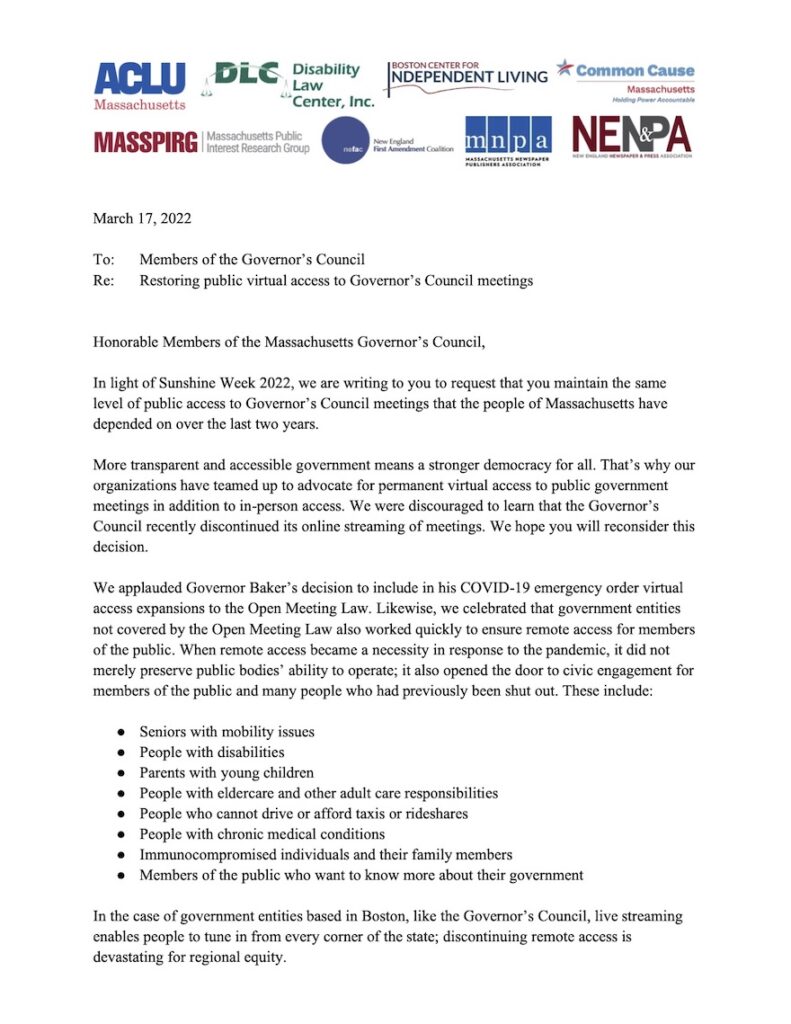 Honorable Members of the Massachusetts Governor’s Council,
Honorable Members of the Massachusetts Governor’s Council,
In light of Sunshine Week 2022, we are sending you the attached letter requesting that you maintain the same level of public access to Governor’s Council meetings that the people of Massachusetts have depended on over the last two years. The letter is attached and can also be found in its entirety at the bottom of this email.
Thank you for your consideration of this important issue.
Sincerely,
ACLU of Massachusetts
Boston Center for Independent Living
Common Cause Massachusetts
Disability Law Center
Massachusetts Newspaper Publishers Association
MASSPIRG
New England First Amendment Coalition
New England Newspaper and Press Association
* * *
March 17, 2022
Honorable Members of the Massachusetts Governor’s Council,
In light of Sunshine Week 2022, we are writing to you to request that you maintain the same level of public access to Governor’s Council meetings that the people of Massachusetts have depended on over the last two years.
More transparent and accessible government means a stronger democracy for all. That’s why our organizations have teamed up to advocate for permanent virtual access to public government meetings in addition to in-person access. We were discouraged to learn that the Governor’s Council recently discontinued its online streaming of meetings. We hope you will reconsider this decision.
We applauded Governor Baker’s decision to include in his COVID-19 emergency order virtual access expansions to the Open Meeting Law. Likewise, we celebrated that government entities not covered by the Open Meeting Law also worked quickly to ensure remote access for members of the public. When remote access became a necessity in response to the pandemic, it did not merely preserve public bodies’ ability to operate; it also opened the door to civic engagement for members of the public and many people who had previously been shut out. These include:
- Seniors with mobility issues
- People with disabilities
- Parents with young children
- People with eldercare and other adult care responsibilities
- People who cannot drive or afford taxis or rideshares
- People with chronic medical conditions
- Immunocompromised individuals and their family members
- Members of the public who want to know more about their government
In the case of government entities based in Boston, like the Governor’s Council, live streaming enables people to tune in from every corner of the state; discontinuing remote access is devastating for regional equity.
Remote access is the latest instance of universal design—alongside curb cuts, elevators, closed captioning, audiobooks, and other features—that began as accommodations and expanded to universal popularity. Like these innovations and others emerging during the pandemic, remote access to public meetings should become a permanent feature. Eliminating remote participation now shuts the doors on so many who have, for the first time ever, been able to access and engage their government without hindrance or just wanted to learn more about government decisions. Virtual access must be a part of our new normal in a 21st-century democracy.
The people deserve to know what their government is doing. The important work of the Governor’s Council to evaluate judges and other gubernatorial appointments, consider pardons and commutations, and review warrants for the state treasury impacts the lives of all 6.9 million residents of the Commonwealth. In the spirit of Sunshine Week 2022, we respectfully ask that you work quickly to reestablish the means by which people can virtually access the Governor’s Council meetings in addition to attending in person.
Sincerely,
ACLU of Massachusetts
Boston Center for Independent Living
Common Cause Massachusetts
Disability Law Center
Massachusetts Newspaper Publishers Association
MASSPIRG
New England First Amendment Coalition
New England Newspaper and Press Association
2022 New England Journalism Student Scholarship Deadline Extended
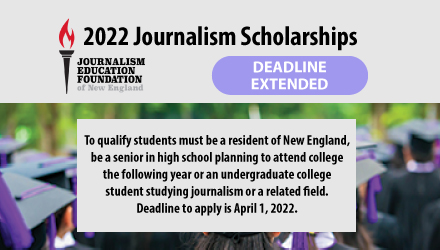 The New England Newspaper and Press Association awards up to 10 scholarships each year to aspiring journalists through the Journalism Education Foundation of New England. Our foundation strives to encourage and support young people who plan to pursue a career in the newspaper industry.
The New England Newspaper and Press Association awards up to 10 scholarships each year to aspiring journalists through the Journalism Education Foundation of New England. Our foundation strives to encourage and support young people who plan to pursue a career in the newspaper industry.
The application deadline is extended until April 1, 2022.
College students or high school seniors who are studying and acquiring work experience that will prepare them to work in the field of journalism are eligible to apply.
For more information contact students@nenpa.com.
To qualify students must:
- Be a resident of New England
- Must be a senior in high school or an undergraduate college student, studying journalism or a related field, planning to attend college in Summer or Fall 2022.
- Have a GPA of 3.0 or above
- Demonstrate a serious interest in a career in journalism by sending: a cover letter, transcript, resume or biography, letter of recommendation, AND a body of published work in a school news publication, general circulation newspaper, or a similar publication AND/OR a body of work prepared for a journalism class
- PLEASE NOTE: You will be required to sign in to Google to upload documents.
- The deadline to apply is April 1, 2022.

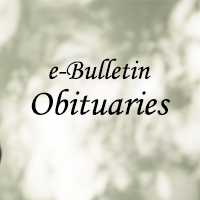

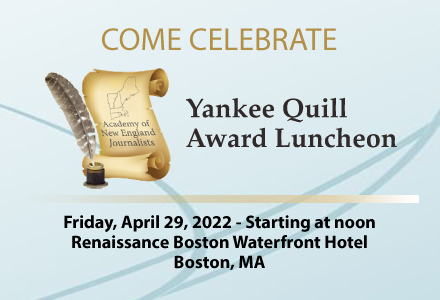
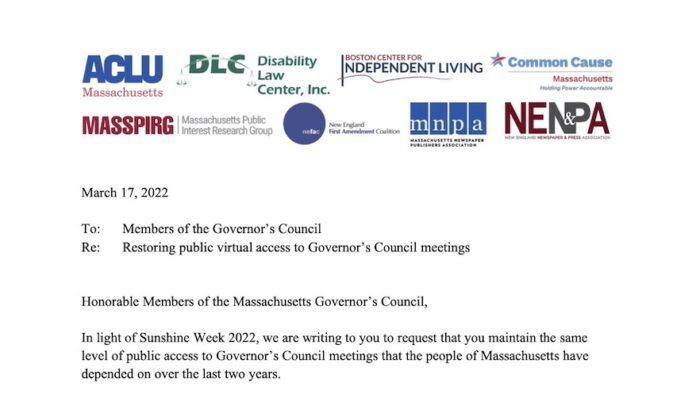
Worcester Telegram & Gazette to Receive NEFAC’s 2022 Freedom of Information Award
The New England First Amendment Coalition will honor the Worcester Telegram & Gazette with its 2022 Michael Donoghue Freedom of Information Award.
The FOI Award is given each year to a New England journalist or team of journalists for a body of work from the previous calendar year that protects or advances the public’s right to know under federal or state law.
Preference is given to those who overcome significant official resistance.
The Telegram & Gazette began what would become multi-year legal battle against the Worcester Police Department for access to internal affairs reports in 2018. A judge ruled in its favor last year and in January of this year awarded punitive damages — the first time a court has done so since the Massachusetts public records law was reformed in 2016.
The Telegram & Gazette will receive the FOI Award at NEFAC’s 12th annual New England First Amendment Awards online ceremony from 7 p.m. to 8 p.m. on April 13.
Ticket and registration information can be found here. All ticket proceeds will benefit civics and First Amendment education in New England.
The coalition will also present its Stephen Hamblett First Amendment Award and Antonia Orfield Citizenship Award during the program. Raney Aronson-Rath, executive producer of FRONTLINE, will receive the First Amendment Award. The Citizenship Award recipient will be announced soon.
Previous recipients of the FOI Award are The Bangor Daily News (2021); Hearst Connecticut Media Group (2020); the Hartford Courant (2019); Todd Wallack of The Boston Globe (2018); The Sun Journal in Lewiston, Maine (2017); Jenifer McKim of the New England Center for Investigative Reporting (2016); James W. Foley (posthumously), the war correspondent and New Hampshire native killed by the Islamic State (2015); Brent Curtis of the Rutland Herald in Vermont (2014); and Don Stacom of the Hartford Courant (2013).